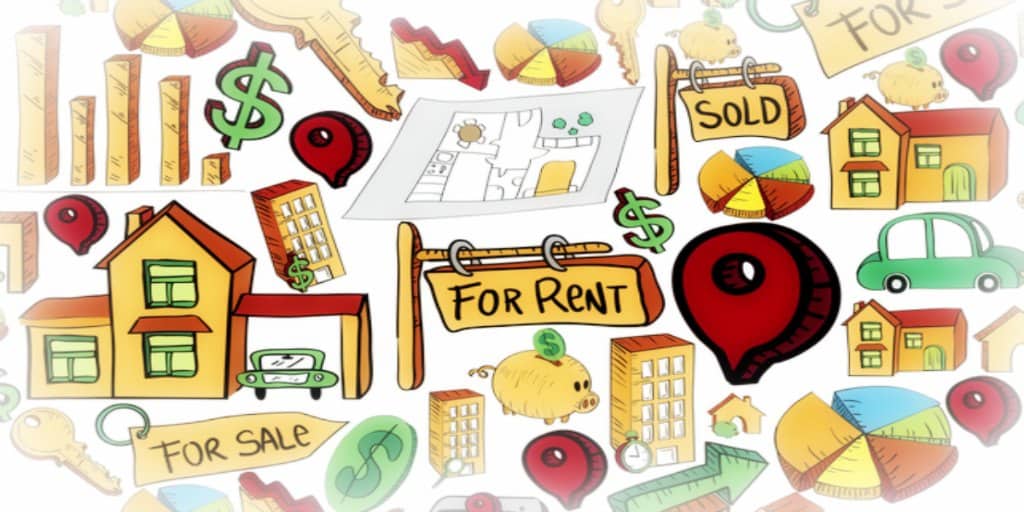House Hacking: Best way to first Invest in real estate?
(This page may contain affiliate links and we may earn fees from qualifying purchases at no additional cost to you. See our Disclosure for more info.)
If you’ve looked into investing in real estate to build wealth, you may have heard the term “house hacking.”
Hacking a house has become an effective and popular way for new home buyers and investors to get started creating wealth through real estate.
But, is using to make money the best way for you to invest in real estate?
Before you dive right in, there’s a lot to think about.
Not only do you have to make sure the numbers are on your side, you have to decide if it’s a good fit for you and your life.
What is House Hacking?
House hacking is buying a property and living in a part of the property while renting out other areas to tenants.

The idea is to have the tenants’ rent payments entirely or partially cover your mortgage and other property expenses while building equity.
House hacking money-making methods vary, depending on the type of property you buy.
Examples
One example is buying a single-family, three-bedroom home, where you stay in one bedroom and rent out the other two bedrooms.
In this example, you share common spaces like the kitchen and living areas (maybe the bathrooms too).
Another option is to buy a multi-family unit, such as a duplex or triplex.
In this example, you live in one unit while renting out other units to tenants. This way, you have your own kitchen, living, and bathroom.
Many different arrangements can work. A multi-family unit may work well as a college town rental for example, while a single-family rental may work better in the suburbs.
It all depends on how you want to set it up and how you plan to invest in the future.
Is Using it to Make Money Right for You?
This is the first question to ask yourself before you go any further. Consider the following:
- Can you live in the same property as your tenants?
- Single-family property, sharing living space with roommates
- Duplex or multi-unit property, sharing common areas only, not living space
- Is your living situation such that it would work well for you?
- Are you prepared to deal with tenant issues, such as clogged toilets and messiness, on the property you live in?
- Do you have the time (and money) to fix problems and/or find contractors to do the work?
- Do you plan to run it as a business (recommended)?
- Or rent to family and friends (not always a good idea)?
House hacking is ideal for single investors, though it can work for some families too.
The key is to really think through your day-to-day living situation and figure out if it would fit well into your life.
Think it through. Write out the pros and cons. Then talk to other investors who have already done it and get their advice.
- What worked for them?
- What didn’t?
- If they were to do it over again, what would they do differently?
Benefits of House Hacking
Let's go over the various benefits you can enjoy with this type of living and investing.
1. Invest in Real Estate and Live for Free Too
When you decide house hacking is a good fit for you, it can be a great way to get started in real estate investing. Not only that, but it can help reduce your housing expenses.
With house hacking, it’s common to have free or low housing since tenants’ rent often covers a large portion of the mortgage. And you’re building equity to boot!
If done right, it’s like getting your cake and eating it too.
2. Enjoy Better Financing Options Available
If you plan to use a property as your personal residence, you might qualify for more flexible loan programs.
You can usually secure better interest rates and have lower down payment options.
For example, owner-occupied properties are often eligible for FHA and VA loans, where non-owner-occupied investment properties typically are not.
Related: How Can I Avoid Paying PMI (Private Mortgage Insurance)?
3. Receive On the Job Training
What better way to learn than by doing?
Not only will you learn about real estate investing, but also about property management.
You'll learn what works and what doesn’t. And if/when you are ready for your next property, you can double down on what went right and avoid what went wrong the first time.
But wait! Before you jump on the house hacking wagon, take some time to think about it, talk to other investors, and get up close and personal with your house-hacking numbers.
Let's take a look.

House Hacking Numbers
They say money is made in real estate when you buy. Buying smart is an absolute necessity to make a real estate investment work for you.
It pays to get the numbers right (literally).
Running the numbers for an owner-occupied investment property is just like running the numbers for any other investment property.
The fact that you will get all or part of your mortgage paid for is just gravy.
Don’t let the draw of free or low-cost housing cloud your judgment on a good investment.
Do your initial calculations as you would as if you weren’t going to be living there. That’s part of your house hacking exit strategy.
If you decide to move out, the property should cash flow without you living there.
Related: Will My Rental Property Make More Money On Airbnb?
Here are a few quick calculations used by investors to decide if a property is worth considering.
These methods are just quick guides to help you decide if you want to take it a step further. Before proceeding, it’s imperative you do your due diligence to confirm all the facts for a particular property.
The 1% rule
The 1% rule means the total rent is at least 1% of the purchase price of the property (more is better!).
Don’t forget to include the cost of any repairs or maintenance needing to be done on the property before you can rent it out.
The 50% rule
This rule assumes the operating expenses (not including the mortgage) will average about 50% of the total rent.
For example, if all units in a property rent for a total of $2000 a month, using the 50% rule, you can estimate expenses at around $1000.
Plan for fluctuations. Some months your costs will be lower, and some months they will be higher.
The cap rate
The cap rate is an estimate of the rate of return on a real estate investment.
Cap Rate = Net Operating Income/Purchase Price.
Net operating income is the annual gross rent minus yearly operating expenses (not including the mortgage principal and interest, but including all other costs, such as taxes and insurance).
For example, if your annual gross rent is $24,000/year and your yearly operating expenses are $12,000, your net operating income is $12,000.
Let’s say you purchased your house for $150,000.
$12,000/$150,000 = .08 or 8% cap rate
The cap rate helps you evaluate a real estate investment against other investment options.
Cash flow
The cash flow for a property will vary. If you are living in a part of the property, your cash flow will be different than if you weren’t living there.
Make sure the cash flow works in both scenarios (remember to have an exit strategy!).
Cash flow = Monthly Net Operating Income – Monthly Mortgage Payment
In the previous example, our net operating income is $1000 monthly ($12,000 annually).
If our monthly mortgage payment is $644 ($120,000 at 5% for 30 years, assuming a 20% down payment), cash flow is $356/month.
Remember, all of these rules are quick calculations to help you decide if you would even consider a property.
There are many other factors, such as maintenance, repairs, vacancies, location, and more to factor in when considering an investment property.
Finding Real Estate Properties to Invest In
You need to run the numbers…and rerun them.
But you also need to learn about your local real estate market, decide what type of property is a good fit for you, and, most importantly, be patient.
A good real estate agent can be invaluable. It’s better to work with someone who has experience with investors and investment properties.
Ask around and join local real estate meetups to find a good fit for you.
Take your time. Look at a ton of properties and decide which ones are most appealing to you.
Consider foreclosure properties including short sales, pre-foreclosures, and bank-owned homes.
Track the list prices, sales prices, and market rent for units of interest and similar properties.
Run the numbers for several hypothetical investments to get a feel for what will work well.
Once you do this for a while, you will start to recognize the properties that could work for you.
As you can see, house hacking can be a fantastic way to invest in real estate, build wealth, and lower housing expenses when first starting out.
But, before you jump right in, make sure it’s a good fit for you.
Do your homework, and network with other investors using this form of alternative investing.
When done right, house hacking can be a great way to start building wealth through real estate.

Article written by Amanda
Amanda is a team member of Women Who Money and the founder and blogger behind Why We Money. She enjoys writing about happiness, values, money, and real estate.
